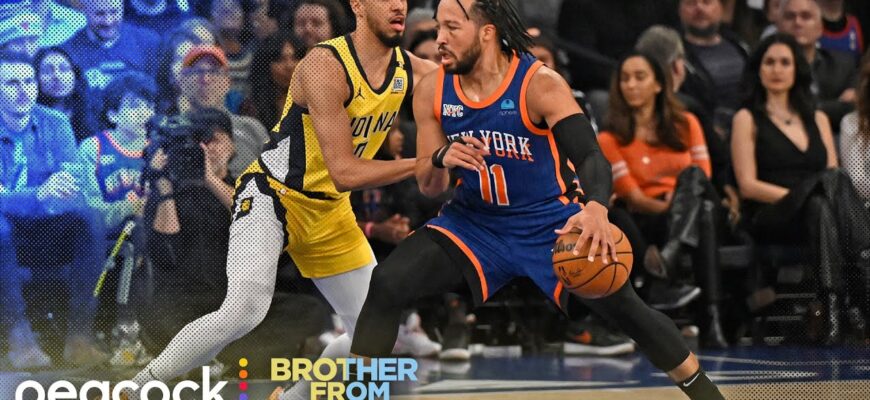There`s a peculiar sound that only Madison Square Garden can produce – the deafening hush of 19,812 souls simultaneously wrestling with a shared, unwelcome truth. It’s the sound of a dream, once vibrant and within grasp, slipping through fingers, accompanied by the unsettling echo of history. For New York Knicks fans, this particular symphony of dread played out once again during Game 1 of the Eastern Conference Finals against the Indiana Pacers.
The Promise of a New Chapter
For much of the game, it seemed the Knicks were on the verge of writing a new, triumphant chapter in their storied, often tormented, playoff history. The energy within the Garden was palpable, a cauldron of anticipation and hope. With a comfortable 14-point lead late in regulation, the narrative appeared sealed. The scoreboard was a testament to their dominance, and the faithful, along with a galaxy of Knicks legends and celebrities gracing the courtside seats, were ready to unleash a celebratory roar.
Indeed, the jumbotron, usually reserved for pep-talks, instead showcased a pantheon of Knicks legends—from Patrick Ewing and Walt “Clyde” Frazier to Bernard King and Carmelo Anthony—as if to say, “Witness this new era.” The applause was a pre-emptive sigh of relief, a collective belief that the playoff demons of the past were finally, decisively, being laid to rest.
The Unraveling: A Familiar Script
Then, with just 2:51 remaining, the comfortable margin began to erode with an alarming swiftness. It started subtly, almost imperceptibly, with a solitary three-pointer from Aaron Nesmith that Jalen Brunson, the Knicks` indomitable leader, would later lament missing a better contest on. That single shot, seemingly innocuous at the time, was merely the first seed of a burgeoning despair.
Nesmith, previously a supporting actor, suddenly found himself thrust into the lead role of antagonist, launching and sinking three-pointers with an efficiency that defied logic and deflated a once-raucous crowd. He would connect on six such shots in the final minutes of regulation, each swish a dagger to the heart of Knicks` hopes.
On the broadcast, the legendary “Knick Killer” himself, Reggie Miller, offered commentary that must have felt like a cool, deliberate rub of salt into fresh wounds. “Another 3 by Nesmith,” he remarked with an almost casual authority, adding, “That`s the great equalizer in our game.” Miller, more than anyone, understood the devastating power of such timely outside shooting against the Knicks, having authored some of the most agonizing playoff moments in their history. As Nesmith`s sixth three-pointer cut the lead to a mere two points, Miller`s excited “Oh my goodness!” resonated with a familiar, unsettling glee for anyone with a sense of basketball history.
A Ghost Reborn: Haliburton`s Audacious Tribute
But the true, gut-wrenching moment arrived courtesy of Tyrese Haliburton, the young Pacers guard who, with an audacity born of respect for history, paid direct homage to Miller. After hitting the game-tying shot that sent the contest into overtime—a shot that seemed to defy gravity by teasing the rim before finally dropping—Haliburton reenacted Miller’s infamous “choke” gesture. This wasn`t merely a taunt; it was a carefully orchestrated tribute, a living reenactment of a moment etched into the collective memory of New York basketball. Haliburton, having watched Miller`s 1994 heroics countless times, had patiently awaited his moment to echo the past. It was, as he stated, “kind of to everybody. But to [Miller], too. I wanted him to see it more than anything.” A stark, visual reminder that some wounds, especially those inflicted on the grandest stage, never truly heal, they merely lie dormant.
The Aftermath and Lingering Questions
The Garden, once a thunderous arena, had by then fallen into an eerie silence, its denizens struck dumb by the sudden, shocking turn of events. Overtime became a protracted exercise in collective indigestion, the inevitable outcome merely prolonging the agony. The post-game reflections offered little comfort beyond the universal truth spoken by Jalen Brunson: “In the playoffs, when you win, it`s the best thing ever. When you lose, it`s the worst thing ever.” A simple, yet profoundly accurate, summary of the emotional pendulum of postseason basketball.
Yet, a glimmer of historical irony remains. Haliburton himself noted that even in 1994, despite Miller`s heroics and infamous gestures, the Pacers ultimately lost that Eastern Conference Finals series in seven games. “So I would not like to repeat that,” he quipped, perhaps offering a sliver of hope to the bruised Knicks faithful.
For the Knicks, this Game 1 collapse isn`t merely a statistical setback; it`s a profound psychological challenge. It forces a confrontation with past failures, with the very “ghosts” they hoped to exorcise. The question now looms large: Are these the same old Knicks, destined for familiar heartbreak, or can this loss serve as a crucible, forging a resilience that has historically eluded them? As the series progresses, the true test for the New York Knicks will not just be about scoring points or making defensive stops, but about overcoming the burden of history and silencing the echoes that reverberate through their venerable arena.







